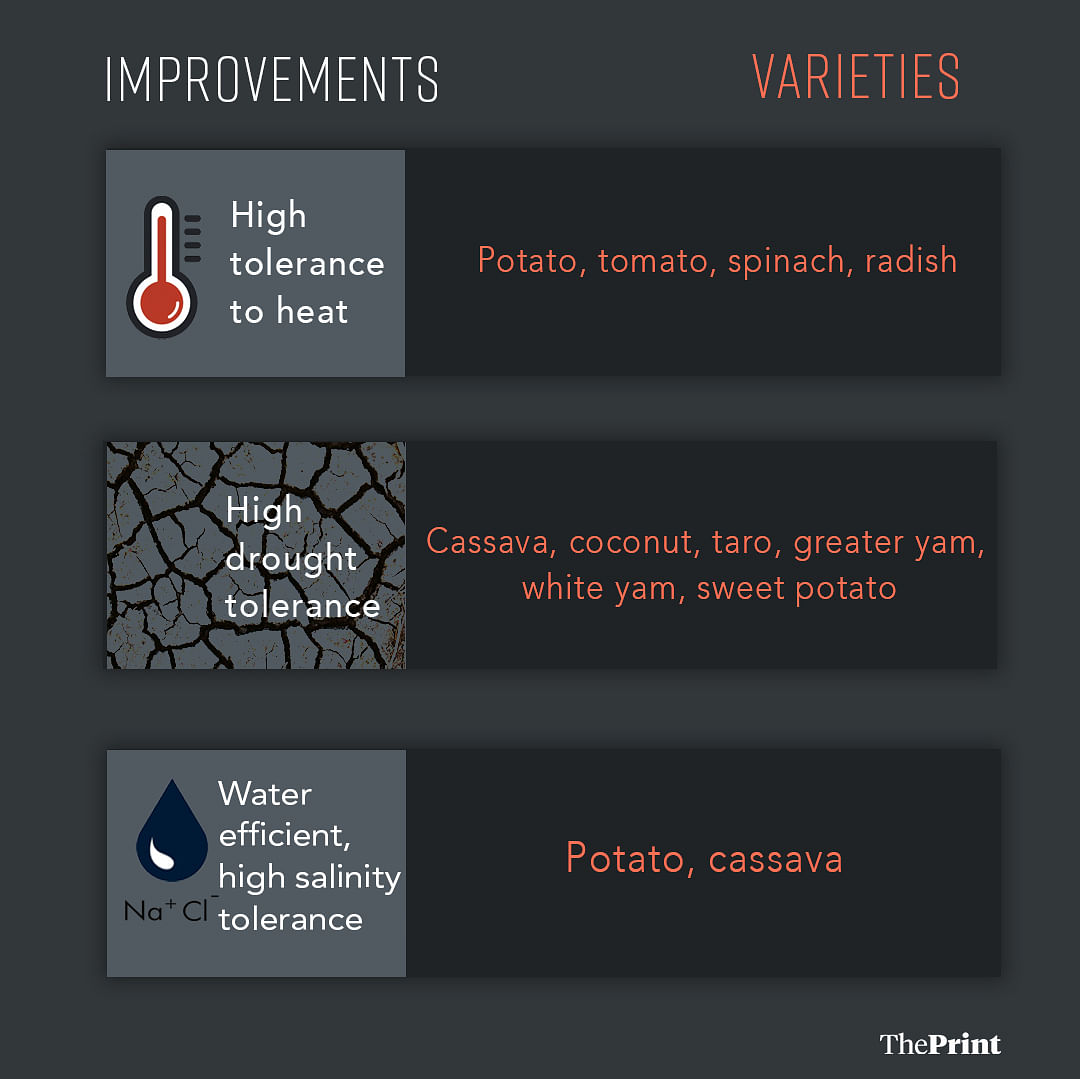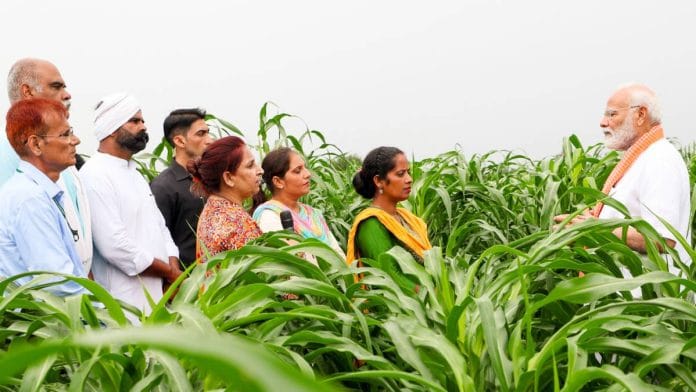New Delhi: From wheat varieties that can brave intense heat to pulses that can survive insect infestations, India appears to be preparing for another “crop revolution”, with the Indian Agriculture Research Institute (IARI) working on developing a number of crop and horticulture seed varieties that are not only higher in nutritional value but also more climate-resilient.
On Sunday, Prime Minister Narendra Modi unveiled 109 high-yielding, climate-resilient, and biofortified varieties of crops at the IARI in Delhi. These 109 varieties of 61 crops include 34 field and 27 horticulture crop varieties of millets, forage crops, oilseeds, pulses, sugarcane, cotton, and fibre crops. Among the horticultural crops, varieties of fruits, vegetable crops, plantation crops, tuber crops, spices, flowers, and medicinal crops were also unveiled. These crops will be available for use in the next three years.
IARI scientists said that these seeds, which have a higher tolerance to extreme climate and higher nutritional value, will help India prepare for the impacts of climate change, and will also guarantee food security in states battling malnutrition and undernutrition.
Also read: Budget 2024: Rs 1.52 lakh crore for agriculture & allied sectors, emphasis on natural farming
Developing climate-resilient and biofortified seeds
A senior scientist from IARI said that the National Agricultural Research System (NARS) has been working on the development of climate-resilient seeds since 2014.
Currently, it is testing 2,380 varieties of different field crops, of which 1,971 crops — cereals (913), oilseeds (335), pulses (364), forages crops (106), fibre crops (189), sugarcane (54), and potential underutilised crops (10) — are climate-resilient with tolerance to one or more biotic and abiotic stresses.
Biotic and abiotic stressors are factors that impact a seed’s growth. Biotic stresses include damage caused by worms, insects, or weeds, as well as bacterial and fungal growth. On the other hand, abiotic stresses include factors such as temperature fluctuations, water salinity, floods, and droughts.
For instance, some traditional seeds of pulses are highly susceptible to pest attacks and diseases. Certain extreme weather conditions also have dire impacts on their yield.
“These seeds will have greater resilience to environmental stressors, which means that they will provide greater yield and will also improve farmers’ income,” the scientist said, asking not to be named.
Out of the climate-resilient varieties that IARI has developed, 429 field crops have “high tolerance” to drought, waterlogging, saline or alkaline soils, heat, and frost.

Among the batch of 487 varieties of horticulture crops: two potato, two tomatoes, one spinach, and one radish varieties have been developed to have high tolerance thresholds to heat; four cassava, three coconut varieties, two taro, and one each of greater yam, white yam and sweet potato for drought tolerance; three potato varieties for water use efficiency; and one cassava variety developed for salinity tolerance.
Researchers said that during its trial phase, these climate-resilient varieties showed enhanced production even during two consecutive years of drought and heatwaves.
“We have seen that the Varietal Replacement Rate (VRR) has been enhanced significantly in major crops. Focused efforts are now being made to include these newly released climate-resilient varieties in the seed chain,” the IARI scientist said.
According to government data, the VRR — the rate at which farmers replace old cultivars, which is also an important marker in assessing high crop productivity and acceptance of the crop variety among users — was around 69% for rice, 92% for wheat, 97% for pigeon pea, 91% for chickpea, 94% for mung bean, 99% for lentil and 78% for mustard even during low-productivity years.
Apart from better adaptability, these seeds also promise to improve crops’ nutritional value. Trilochan Mohapatra, director general of ICAR, said that the institute has also developed 87 biofortified cultivars for 16 crops that can be integrated into the food chain to enable better health in humans and animals.
Of these, 48 cultivars were “multi-nutrient dense”, with two or more traits combined in a single genotype. This process, called biofortification, enriches the nutritional quality of crops by using conventional plant breeding and modern biotechnological techniques.
Taking the initiative forward
Agriculture and food security experts said that such initiatives should not be limited to the research stage and the government should also take active measures to ensure that these seeds reach farmers.
Avinash Kishore, a senior research fellow in the Development Strategies and Governance Unit, International Food Policy Research Institute (IFPR), said breeding crop varieties improves their resistance to external environmental factors, ensures higher returns, and enhances their potential overall.
“For instance, wheat is susceptible to high temperatures, and if the heat is too intense during its growing stage, it can hurt the crop yield. While such research is much-needed, the policymakers also need to take measures to have better regulatory and marketing strategies so that these crops reach the farmers and they can get the maximum benefit from it,” Kishore said.
The agriculture ministry said steps are simultaneously being taken to make these seeds available in government seed shops. “Within three years, farmers will start receiving all these 109 varieties. All Krishi Vigyan Kendras (KVKs) have been directed to make farmers aware of these varieties and their benefits,” Shivraj Singh Chouhan, union minister of agriculture and farmers’ welfare, said at the IARI, Delhi, when the seeds were unveiled.
(Edited by Sanya Mathur)






